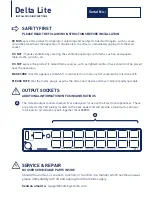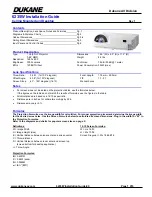
71
Glossary
(cont.)
Category
Item
Descriptions
Page
Advanced
setting of
connection
AD_HOC
This is the mode in which computers communicate with each other
directly, rather than via access points.
25
54
INFRASTRUCTURE
(infrastructure mode)
This is the mode in which communications are performed via the
access point.
24
54
SSID
Abbreviation for Service Set ID. The SSID identification code must
be set to distinguish equipment included in a wireless LAN that uses
access points from equipment not included in that LAN.
This may appear as the “ESSID” or the “network name” for wireless
LAN adapters made by some manufacturers.
25
54
Open System/
OPEN
This is an authentication of wireless signals employing a public key
encryptosystem.
25
54
Shared Key/
SHARED
This is a secret key encryptosystem for wireless signals in which
authentication is performed with a key pre-set in the WEP.
Other terms for this method, in which the same key is used for both
encryption and decryption, are “shared key encryptosystem” and
“common key encryptosystem”.
25
54
WPA-PSK
WPA2-PSK
This is a standard covering encryption methods used in wireless LAN.
It provides greater security than WEP, and has functions such as a
user authentication function and also TKIP (encryption protocol) which
automatically changes the encryption key at fixed intervals.
And this authentication requires no authentication server.
54
55
WEP
Abbreviation for Wired Equivalent Privacy. This is a method for
encrypting communication data. The encryption key is created and
notified only to the communicating user, so the communication data
cannot be decrypted by a third party.
17
25
54
55
TKIP
Abbreviation for Temporal Key Integrity Protocol.
This encryption protocol provides even greater security than WEP
because it changes the encryption key at fixed intervals.
54
AES
Next generation standard cryptography standerdized by the National
Institute of Standards and Technology (NIST).
AES: Advanced Encryption Standard
17
54
55
64









































